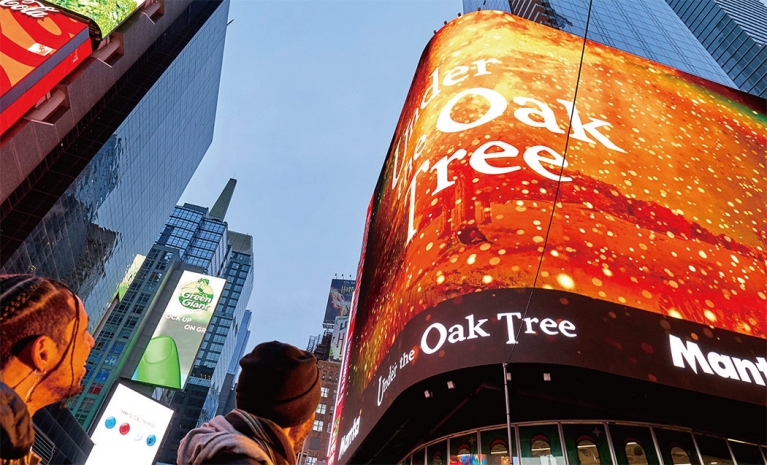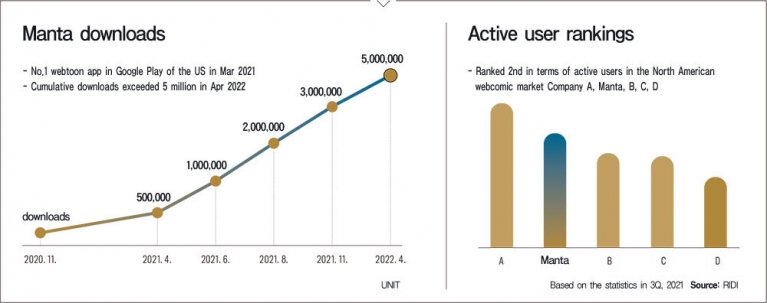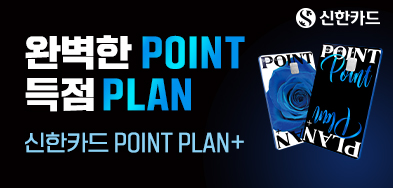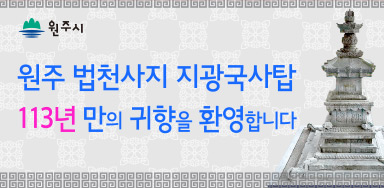RIDI has established itself as leading global webcomics platform in just two years after launching its subscription service Manta, and joined the ranks of unicorns by raising KRW 120 billion recently. Its evolution from serving e-books to digital novel and webcomics has been turbocharged by original IPs, the very essence of a content platform.
The finale was always the same: Heroes put up the gloriously fluttering Stars and Stripes at the end after saving the humanity from an alien attack. As expected, it is the NASA insignia that emblazons their spacesuits. The Billboard chart, the Oscars, the Cannes Film Festival, and the Premier League were all adorned with familiar faces, most of which were Anglo-American or Latino, but never Korean. It felt only natural and expected. Or at least we thought so.But the landscape is changing in 20 years after the buzz and excitement of the new millennium. The center of gravity on the global culture scene that we thought we would never reach is now coming to Korea. This is indeed a seismic shift for many Koreans, powered by new digital platforms, which effectively wiped out all sorts of barriers like national border, race, or language. Asian values which had been pushed out to the very periphery have overcome the infamous Orientalism to emerge as a new force that leads the global culture. And at the center of this shift stands Korea.After Harvard professor Joseph S. Nye Jr. emphasized the importance of “soft power”, culture has served as yardstick to measure a nation’s competitiveness after military and economic power. We don’t have to mention BTS, director Bong Joon-ho, [Squid Game] or Son Heung-min to show the cultural prowess of Korea as the hottest content maker across the world. No wonder why many Koreans can never stop talking about it, reveling in all the attention.
Webcomics, the next runner for K-contentsFlagbearers of K-contents now make the headlines across the globe. Superstars and celebrities are leading at the front, but there are others quietly expanding the Korean Wave behind. One of them is webcomics. Before, platforms to produce and distribute comics were confined to paper books and animation films. But Korea introduced a new genre called webcomics and successfully made them settled in a digital ecosystem. Even now, there are only a couple of countries that have successfully established platforms for webcomics – Korea, as you all know, and China who entered the market right after Korea.Last February, Singaporean sovereign wealth fund GIC took the industry by surprise by investing KRW 120 billion in RIDI, the Korean webcomic and web novel platform, along with other investors such as Korea Development Bank, NVESTOR, and Atinum Investment. This means RIDI’s foray into the market to challenge the first-generation platforms like Naver Webtoon and Kakao Page has been recognized highly by global investors. With the investment coming from GIC, RIDI has become the first Korean content platform that has earned unicorn status, valued at KRW 1.6 trillion in the financing round.Founded by Bae in 2008, RIDI first offered services as an e-book platform. That’s why it is still known as Ridibooks to more Korean users. Since it first started as an e-book company, it offers Ridi Paper, an equivalent to Amazon Kindle, and e-book services on other mobile devices such as smartphones, tablets, and PCs. When asked about RIDI’s core identity, however, Bae answers it is a global webcomics company. “It is a service company that creates webcomics based on text IPs such as books or web fictions if I have to give more details to that definition”, adds Bae. Given the fact that RIDI started the web fiction service in 2017 and then only introduced webtoons in 2020, we can say the bold pivot toward webcomics is producing results fast.“RIDI was an e-book company for a long time after launch. Later, we started to offer web fiction services by splitting a book into short chapters and offer them in a serial format with the design suitable for mobile readers. It was not a totally new attempt nor a difficult challenge. We just realized we have a very competitive portfolio of quality contents and IPs, unrivaled both in depth and width. So we decided to expand our service into webcomics by brining our original text IPs into a webcomics format. RIDI now has millions of webcomics titles based on its original fictions. Surely, there are more to come.”Ridibooks changed its name to RIDI last March. Having “books” in its name made the company look like just an e-book company, so he decided to lose “books” from the name in order to establish itself as a content platform where you can enjoy all types of contents from webcomics to web fictions as well as e-books. However, the market didn’t understand his intention right away. He was frequently asked why an e-book company suddenly started to offer comics on its platform. Thankfully, it didn’t take much time for people to see the power of original contents after RIDI turned its text IPs into webtoons, videos and even soundtracks. Books are contents after all, so it is not a far-fetched idea at all to convert them into other content genres.“In the broader sense, I think webcomics and web novels should be seen as books. My definition of a book is what motivates readers to spend time and money to enjoy the content. We can just say papyrus in the ancient Egypt evolved to paper during Guttenberg’s time and then to a digital format. What changed is a vehicle for the contents, but what readers want didn’t change much. Never did I think e-books were the only contents we could offer.”
Webcomics and web fictions – they are all books after allRIDI was a latecomer in the market dominated by content dinosaurs like Naver, Kakao and Lezhin Comics, but it certainly made its presence known. “Contrary to what it seems like from the outside, the new business model is not so different from what we had been doing, so we were able to produce an actual result fast”, says Bae. In the end, it all boils down to the power of contents. RIDI currently owns 260,000 content products. Among them, more than 1,000 scored KRW 100 million or more in cumulative revenue. In its talent pool, RIDI has 111,000 writers registered and counting.Touting itself as a trove of limitless contents, RIDI chooses a totally different approach from its competitors when it publishes webcomics. Having more than 111,000 authors registered certainly helped the company to continue on its path: when other platforms tried to make themselves competitive by paying a hefty sum of money for famous artists and their hit products, RIDI focused on creating webcomic titles with its original IPs. Illustration was taken care of by leveraging the internal team or outsourcing the works. RIDI didn’t have to rely on the reputation of individual artists because it believed what’s more important was to find the right look and feel for each IP it owns. The best example is [Under the Oak Tree], a mega hit title based on RIDI’s original IP. It’s a romance fantasy serial written by Kim Suji and published by RIDI since 2017. With more than 400 episodes released and still counting, it is certainly the biggest hit novel on RIDI by all means.RIDI turned the web fiction into a namesake webcomics and released it in August 2020. [Under the Oak Tree] won the grand prize at the RIDI Webcomics Award for two consecutive years in 2020 and 2021, scoring a home run as webcomics after attracting a huge population as web fiction. The title is also available on Manta, RIDI’s global webcomics subscription service, building a global fan base by recording seven million views in just five months. In 2021 and 2022, RIDI released theme songs for the male and the female protagonist, expanding into the soundtrack business, each of which topped a music streaming site. Its success does not end there. [Under the Oak Tree] made it to the bestseller list in five countries serviced by Amazon. It surely shows how a well-written original IP can be adapted into various formats with a great success.“It is difficult in reality to bring celebrity artists to a latecomer platform like RIDI, but RIDI’s true strength comes from hundreds of new stories released every month exclusively on its own platform. We saw the potential of these original IPs as source for great webcomics. Look, we had these countless compelling stories coming out every month, but all of them were in texts, failing to reach the wider audience. So we studied what others did in films, dramas and games, and applied their approach to webcomics by setting up a creative team that produces webcomics together, different from the conventional model that relies on sheer creativity of one genius. I can proudly say RIDI has introduced the most structured process to achieve this at scale, transforming the webcomics production paradigm”, explains Bae.“Webcomics is just a format; a format itself can’t determine what could be in the storyline”, adds Bae. As he has described, it was the power of diverse original stories that made RIDI, a mere newcomer, into a unicorn backed by global investors in just three years of entering the webcomics market.
True potential of original IPsBacked by hundreds of exclusive contents released every month, RIDI has arguably created the most secure business moat. These days, content companies fight tooth and nail to develop original IPs with hit potential. After Korean film director Bong Joon-ho received Best Picture and Best Director awards at Academy Awards, and Netflix attracted massive global viewers with Korean contents, Korea has now emerged as a treasure trove for the global content industry that had long been confined into the Anglo-American world but now looks beyond to find the next hit IPs. What’s more, since OTTs and cable channels get much more views than TV networks these days, securing popular titles now determines a success or a failure of business. “Finding and securing original stories has become critical, and there are not many companies in the global market that have as many exclusive original IPs as RIDI”, Bae says with confidence.Manta, the webcomics app that helped RIDI grow to a global business, has chosen a completely different path from other Korean content providers by introducing a subscription service as key payment scheme.“Every webcomics service in Korea charges per episode. Readers have to pay for every episode they want to read. RIDI used to have such pay-per-view scheme in the past, but with Manta, we chose to introduce a monthly subscription service, so our users can enjoy every episode they want by paying just USD 3.99 per month. Netflix stirred up a sensation in Korea with this subscription model when it first entered the country. The subscription service is, in fact, the most common payment model in the Western countries”, says Bae.The bold decision paid off. Manta, launched in the North American market in November 2020, continues a rapid growth with five million downloads until April this year. It soared to no. 1 among the comics apps at Google Play in just four months of its launch, and ranked no. 1 in 16 nations including the US as of this May. It also remains top 5 in 71 nations. In Apple’s App Store, Manta climbed to no. 4 in the free e-book category last August, and ranked no. 1 in 16 nations in May. It is currently no. 2 webcomics app in North America in terms of active users, which is a meaningful feat achieved in just 10 months of its launch.“Many users in the US and Europe don’t know how to use a service if there is no subscription model available. When Manta offered a subscription service from the start, users in those markets welcomed the decision, saying ‘finally’. How can our readers finish a 500-episode webtoon without a subscription model? By purchasing every episode one by one? It is no wonder our subscription service went viral.”Bae explains latecomers can turn their weakness into strength by learning from errors of firstcomers and emulating what they are doing well. This could help them make up for the gap against frontrunners. Being there first does not necessarily mean they have no weakness. Many of the frontrunners are likely to have a poor business design since they had to deal with many unknowns, but latecomers can avoid pitfalls by studying competitors who were there first, and discover their own strengths more effectively.
Lure female readers to go mainstream
▎[Under the Oak Tree] ads on the NY Times Square in January |
|
Select & Focus is another approach pivotal to RIDI’s success. RIDI’s platform is filled with romance fantasies such as [Under the Oak Tree], a category with strong appeal to female readers. It offers other genres like suspense or epic, but titles targeting female readers in their 20~30s take up a disproportionately high share, and the platform itself has the look and feel of a comic bookstore specialized in romance. “RIDI is clearly a top tier when it comes to web fictions and webcomics targeting female readers”, says Bae. Not only that, RIDI chose to offer BL(Boy’s Love) as a main category, bringing what was once regarded as hushed sub-culture into the mainstream. Asked what prompted such a bold move, Bae answered “it was only possible since I was new to the content business”. It was an unexpected answer, coming from a person who has been in the content industry for 15 years.“I majored in electric engineering, which planted in me an engineer’s mindset. I come this far in the content business but never in my life did I see myself as content expert. Viewing things from an engineer’s perspective helped me remain unbiased whenever we choose genres we need to focus on. I still listen to content experts when we reshuffle our content portfolios, and in the process, female-oriented contents have naturally emerged as our strength after we repeated the process several times. [Sherlock Holmes], the forefather of detective stories, was also a sub-culture in the beginning, but became revered as classic in 100 years.”Such open-mindedness towards contents has helped the company find its identity in contents and develop its business strategy strictly based on customer data. According to RIDI Code, the code of conduct that defines RIDI’s culture and work practice, the company works to “view from a customer’s perspective at the first and last stage of business” and “leverage both data and insight” in the decision-making process. Bae says, “I try to see every issue from a customer and a data perspective”. This is how RIDI shaped its business identity around female-oriented contents. Women accounts for more than two thirds of the RIDI readership, and the proportion remains more or less the same in competing platforms. Bae says women are the major consumer group in the content market. “Go to any offline bookstores. You can see more women there as well”, he adds.RIDI’s strategy to fast keep up with the market trends and promptly respond to customer needs has made the company thrive in the global market as well after it launched Manta, even though it was never RIDI’s intention to go global with Manta. The massive investment from a foreign investor like GIC was only possible as GIC agreed to business objective and strategy by RIDI and Manta. Bae believes the increasing impact of K-contents was also a contributing factor. “Only the US, the UK, Japan and Korea are exporting cultural contents with global appeal”, says Bae, emphasizing it was only his subjective assessment.“It is rare that a French movie or an Indian song becomes loved by the global audience. Korea’s cultural power has been recognized by global investors as its contents go mainstream, enjoyed across the globe through digital platforms. There are only a handful of countries in the world that can service and export contents to the global market. GIC is known to value a stable and innovative business model when it makes an investment. RIDI has been in the market for 15 years with the stable performance while, at the same time, expanding into new businesses including webcomics. This seems to have scored a high point with GIC.”
The 1st Korean unicorn in contentsFinancial stability is a must for startups to jumpstart a rapid growth. And even if they manage to prove their growth potential and receive massive investment, they cannot sustain growth when they fail to build a business structure that can stand on its own. As for RIDI, it already faces the 15th year of operation and has been in the black for two to three years. RIDI’s animation streaming subsidiary, Laftel, also swung to profit last year. RIDI, which had recorded KRW 155.5 billion in revenue and KRW 2.5 billion in operating profit on a consolidated basis in 2020, turned into the red in 2021, recording KRW 19.1 billion in operating loss. But still, it managed to increase its revenue to KRW 203.7 billion. Bae said it was the result of “Manta making a new investment”, adding “it is not a concern as we continue to bring in new investment and improve our profitability.” He explains that with new people joining in, it has become more urgent to build a corporate culture that fits the company’s ever-growing size. Such effort to create the desired corporate culture gave birth to RIDI Code two years ago.“I don’t like being unilateral, giving out orders or forcing rules, but felt the need to share what I believe is the good culture and practice with our people while we build up our scale. RIDI Code was created by selecting what we want to build on further among what we already have in our work culture. It serves like the Constitution. It took longer than one year to discuss with our people what sets us apart, where we excel, and what we have to observe in business.”RIDI Code defines three principles – decision making, communication, and work ethics – and lays out five rules of conduct under each principle. RIDI Code applies to every work meeting and decision-making process, and employee recruitment and evaluation should proceed in accordance with RIDI Code.Bae stresses RIDI Code is especially important when scouting for talents. RIDI recently brought Lyla Seo, the former regional director of Tinder in East Asia, as CMO for the company, and Google engineer Cho Seong-jin as CTO. To attract talents more aggressively, it also raised the annual salary by 30% for lateral hires in the first half of this year.“We look at two areas when we are out to find new people. We first see whether they have what RIDI Code asks for, and then see whether compensation is attractive enough for them. We want to make sure that no one gives up joining our company just because they are unhappy with compensation. But we also don’t want them to come just for money. RIDI Code can be used to filter out those people.”To the last question on his mid-to long-term business goal, Bae said, “I know it’s quite simple, but I want to protect RIDI Code as CEO”, adding he wants to “be remembered as founder and first CEO who started the long-term growth of the company.”
RIDI CODEHow RIDI works1. Decision-making1.1 think from customers' perspective from the beginning and also at the end1.2 consider long-term goals1.3 prioritize our firm's interests over team's interests and personal goals1.4 allow the most knowledgeable person to decide, whilst responsibilities are assumed by the leaders1.5 make judgments using both data and intuition
2. Communication2.1 focus on communicating context and intention2.2 use standard language, precise numbers and date conventions2.3 speak up in the face of discomfort2.4 communicate with candor, even at the cost of causing discomfort2.5 maintain respectful manner for colleagues
3. Work ethics3.1 define clear intention before execution3.2 set stretch goals3.3 have grit to drive excellence3.4 once direction is agreed, execute at speed3.5 maintain physical fitness- Jang Jinwon(jang.jinwon@joongang.co.kr)·photo by Jun min-kyu



















